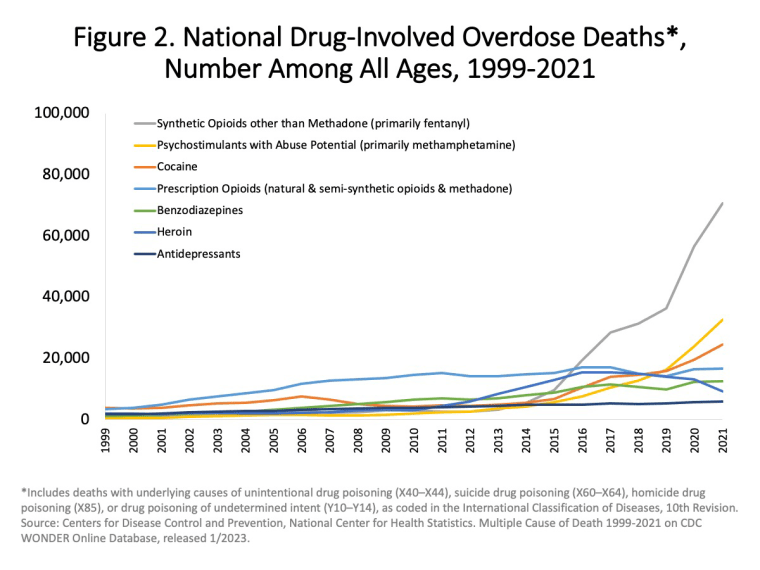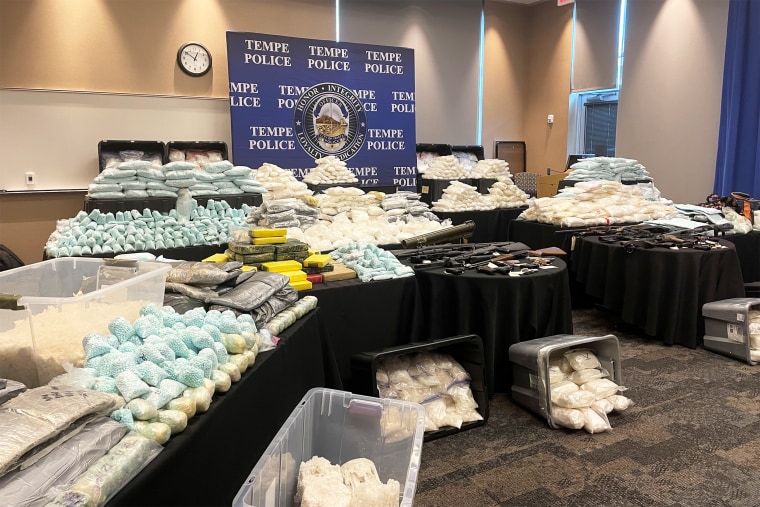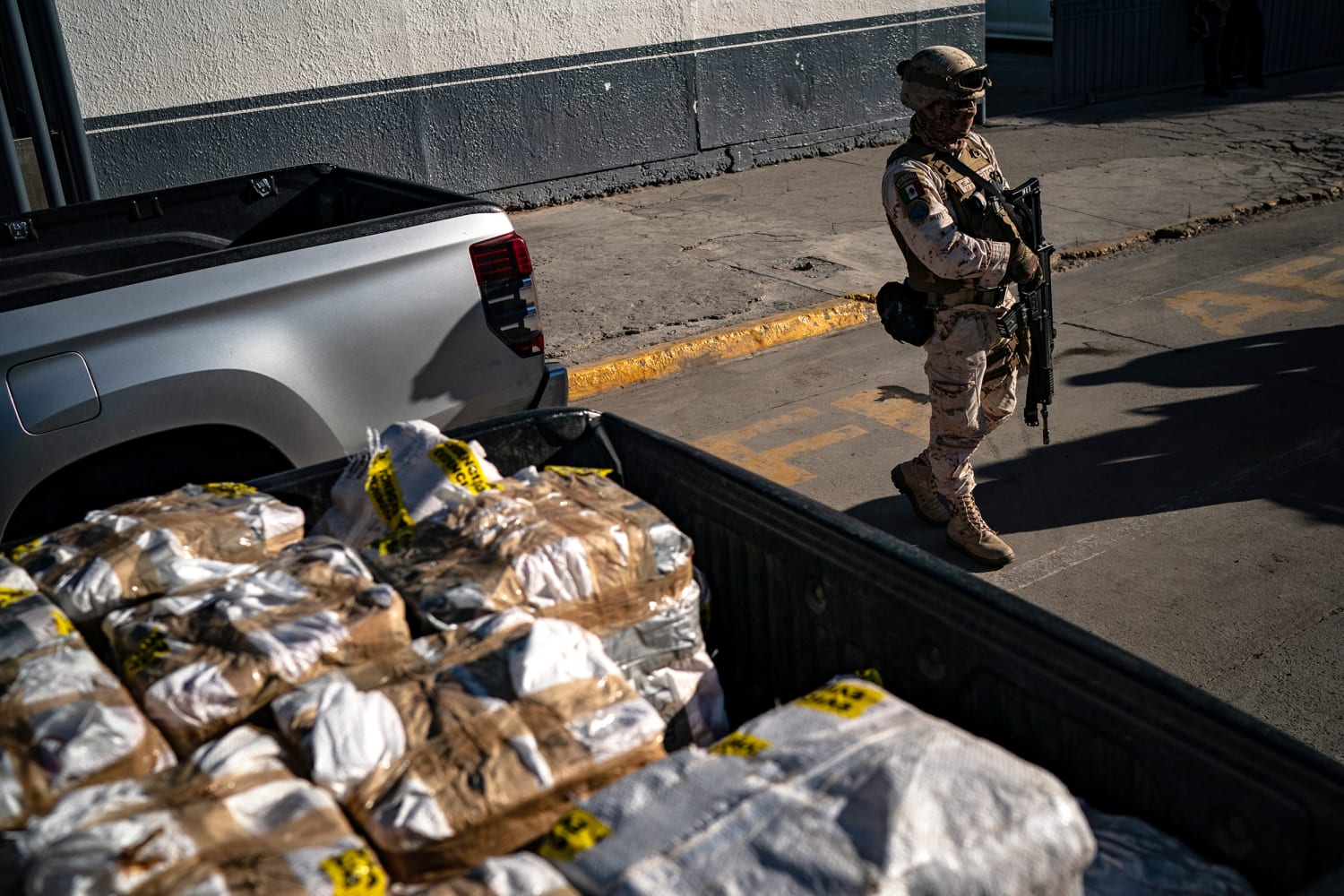But the synthetic opioid fentanyl, which is killing Americans at a fast clip, has raised the stakes dramatically. Washington is angry, and U.S. lawmakers are calling for military action against the cartels — potential acts of war against America’s neighbor and largest trading partner.
“We have a game changer here, and the game changer is a hundred thousand dead people a year,” Feeley said. “Yet, when we most need cooperation on law enforcement and rule of law, we have almost nothing.”
In 2021, 106,000 people died of opioid overdoses in the U.S., more than 70,000 of them largely from fentanyl, according to the National Institutes of Health. Increasingly, people are dying because they took drugs they weren’t aware were fentanyl-laced. No community or demographic group has been spared.

U.S. officials and international experts say the vast majority of the fentanyl sold in the U.S. is produced in Mexico using precursors imported from China.
“The Sinaloa cartel and the Jalisco cartel and their affiliates control the vast majority of the fentanyl global supply chain, from manufacture to distribution,” DEA Administrator Anne Milgram told Congress last month. “The cartels are buying precursor chemicals in the People’s Republic of China,, transporting the precursor chemicals from the PRC to Mexico, using the precursor chemicals to mass produce fentanyl, pressing the fentanyl into fake prescription pills, and using cars, trucks and other routes to transport the drugs from Mexico into the United States for distribution.”
She said it costs the cartels as little as 10 cents to produce a fentanyl-laced fake prescription pill that is sold in the U.S. for $10 to $30.
“The cartels are engaging in deliberate, calculated treachery to deceive Americans and drive addiction to achieve higher profits,” she said.
When he took office in 2018, López Obrador, a leftist populist, announced that his policy toward drug cartels would be “hugs, not bullets.”
Last week, he told reporters, “Here, we do not produce fentanyl, and we do not have consumption of fentanyl.”
He blamed the U.S. overdose crisis on “social decay” in American society, adding, “We deeply lament what’s happening in the United States — but why don’t they fight the problem … and more importantly why don’t they take care of their youth?”

It wasn’t always this way. The relationship slowly decayed from its peak, when joint U.S.-Mexico operations became common in the 2000s under Presidents George Bush and Felipe Calderón. They had started to fall off when Enrique Peña Nieto took office in 2013. After the U.S. arrested Mexico’s defense minister on corruption charges in October 2020, López-Obrador largely ended what little cooperation remained, even making it difficult for DEA agents to remain in the country, Feeley and other experts said.
Mexico was so incensed by the arrest that then-Attorney General William Barr ultimately dropped the case and handed the minister back to Mexico, which exonerated him despite evidence he worked on behalf of a violent drug cartel. Officials on both sides were left seething by the whole affair, current and former U.S. officials say.
A complicated relationship
Privately, U.S. officials say that in his comments about fentanyl, López Obrador was reacting to comments from Republican lawmakers in recent weeks calling on military action against the drug traffickers in Mexico and proposing to designate drug cartels as terrorist organizations.
“We’re going to unleash the fury and might of the United States against these cartels,” said Sen. Lindsey Graham, R-S.C., who called on the president to “give the military the authority to go after these organizations wherever they exist.”
The idea of unilateral U.S. military action against the cartels inside Mexico is anathema to almost any Mexican politician, let alone one who stakes his identity on defying the U.S.
The reality is that the U.S. badly needs Mexico’s cooperation on a host of issues, experts say, not least the mass migration crisis on the southern U.S. border. Mexico is America’s largest trading partner and its most common tourist destination, and it hosts the biggest community of expatriate Americans. The possibility that a U.S. president will take military action in Mexico against the wishes of the government there seems extremely remote.
“We are not contemplating military action against Mexico,” Watson, the NSC spokeswoman, said in a statement.
Everyone acknowledges the Biden administration is in a difficult bind. It needs Mexico’s help on fentanyl, but it isn’t getting much, and it has very little leverage to do anything about it.
A spokeswoman for the DEA declined to comment for this article. But Milgram of the DEA detailed for Congress recently how Mexico refuses to share even basic data.
“We are not getting information on seizures of precursor chemicals,” she said. “We are very concerned about the clandestine labs across Mexico, and we have offered and continue to offer and stand ready to work in partnership with Mexican authorities to dismantle and take down those clandestine labs throughout Mexico jointly and to be of any service that we can.”
Furthermore, she added, Mexico is slow-walking dozens of U.S. extradition requests.
“One of the things we are looking for Mexico to do is to arrest and extradite more individuals to the United States,” she said. “Last year, Mexico extradited 24 drug-related defendants to the United States, but there are 232 drug-related defendants that are awaiting extradition.”
Donahue said the corruption runs so deep in Mexico that Mexican law enforcement spends more time surveilling DEA agents than it does cartel members.
The problems are obvious. Much less clear is how to solve them. One proposal, embraced by some Republican lawmakers and a few experts, such as Feeley, is to designate the cartels as foreign terrorist organizations. Barr, the former attorney general, recently argued that the U.S. should use the military to defeat the cartels, although he left it hazy whether he was saying the U.S. should do that even without Mexico’s permission, which could qualify as an act of war.
Feeley says the U.S. can’t take unilateral action in Mexico, but he and others argue that a terrorist designation would allow prosecutors to more easily go after Americans who help the cartels, using a “material support for terrorism” charge that carries far more stigma than a drug offense.
The Biden administration opposes the terrorism designation, a senior administration official said, but it isn’t opposed to expanding legal authorities to target cartels.
“I do think the Biden administration has been pretty patient with Mexico,” said Rudman of the Wilson Center. “Maybe at times too patient.”
Source: | This article originally belongs to Nbcnews.com










